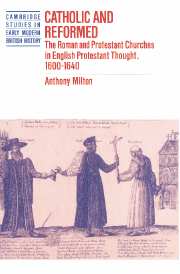Book contents
- Frontmatter
- Contents
- Acknowledgements
- List of abbreviations
- Prologue
- Introduction: English Protestantism at the dawn of the seventeenth century
- Part I The Church of Rome
- 1 ‘This immortal fewde’: anti-popery, ‘negative popery’ and the changing climate of religious controversy
- 2 The rejection of Antichrist
- 3 Rome as a true church
- 4 The errors of the Church of Rome
- 5 Unity and diversity in the Roman communion: inconsistency or opportunity?
- 6 Visibility, succession and the church before Luther
- 7 Separation and reunion
- Part II The Reformed Churches
- Conclusion
- Select bibliography
- Index
- Cambridge Studies in Early Modern British History
1 - ‘This immortal fewde’: anti-popery, ‘negative popery’ and the changing climate of religious controversy
Published online by Cambridge University Press: 31 October 2009
- Frontmatter
- Contents
- Acknowledgements
- List of abbreviations
- Prologue
- Introduction: English Protestantism at the dawn of the seventeenth century
- Part I The Church of Rome
- 1 ‘This immortal fewde’: anti-popery, ‘negative popery’ and the changing climate of religious controversy
- 2 The rejection of Antichrist
- 3 Rome as a true church
- 4 The errors of the Church of Rome
- 5 Unity and diversity in the Roman communion: inconsistency or opportunity?
- 6 Visibility, succession and the church before Luther
- 7 Separation and reunion
- Part II The Reformed Churches
- Conclusion
- Select bibliography
- Index
- Cambridge Studies in Early Modern British History
Summary
THE ATTRACTIONS OF ANTI-POPERY
In 1600 Andrew Willet had urged anti-popery as the main vocation of the Church of England. He argued that it would unite puritans and bishops, enabling them to put the presbyterian upheavals behind them, and would stimulate an awareness of a common identity which conformists and precisians shared. In practice, things were rarely that simple. Estimations of the relative importance of the papal threat, and therefore of the value of opposition to it, were changing during the early Stuart period. Later chapters will study the structure of anti-papal thought in England and will investigate some of the doctrinal changes which possibly underlay these different assessments. However, it will be necessary to devote this first chapter to exploring the rationale of Elizabethan and Jacobean antipopery, and the purposes which it served. After an initial examination of the evaluations built into this ideology, the changes within it will then be placed within the context of the political chronology of the period, and the rapid developments during the 1630s, when the value of anti-popery was fundamentally challenged.Recent scholarship has already demonstrated how anti-papal polemic acted during the Elizabethan period as the established means whereby moderate puritans such as Willet could both display their loyalty to the Church of England, and at the same time affirm their commitment to further reformation.In Jacobean times anti-papal writings, at least in the first half of the reign, were the most distinctive feature of English Protestant theology and occupied the energies of all the principal members of the Jacobean episcopate.
Recent scholarship has already demonstrated how anti-papal polemic acted during the Elizabethan period as the established means whereby moderate puritans such as Willet could both display their loyalty to the Church of England, and at the same time affirm their commitment to further reformation.
- Type
- Chapter
- Information
- Catholic and ReformedThe Roman and Protestant Churches in English Protestant Thought, 1600–1640, pp. 31 - 92Publisher: Cambridge University PressPrint publication year: 1995



